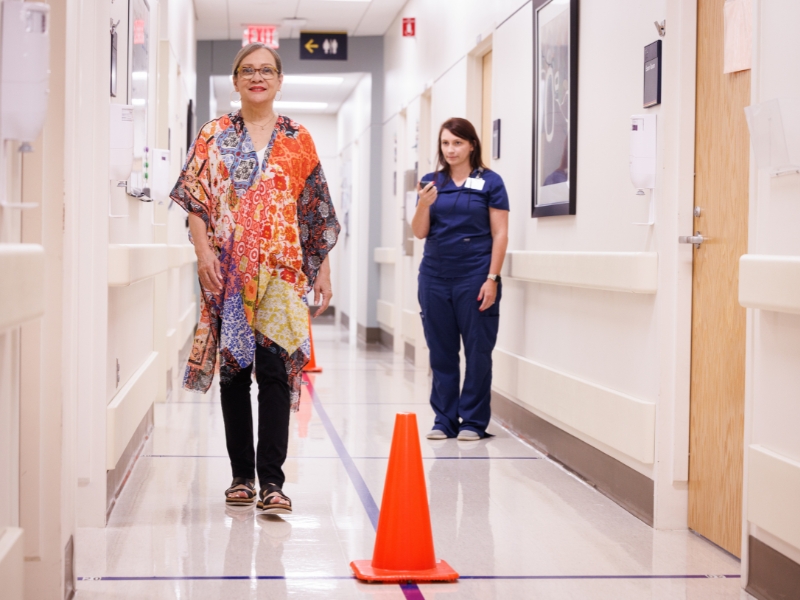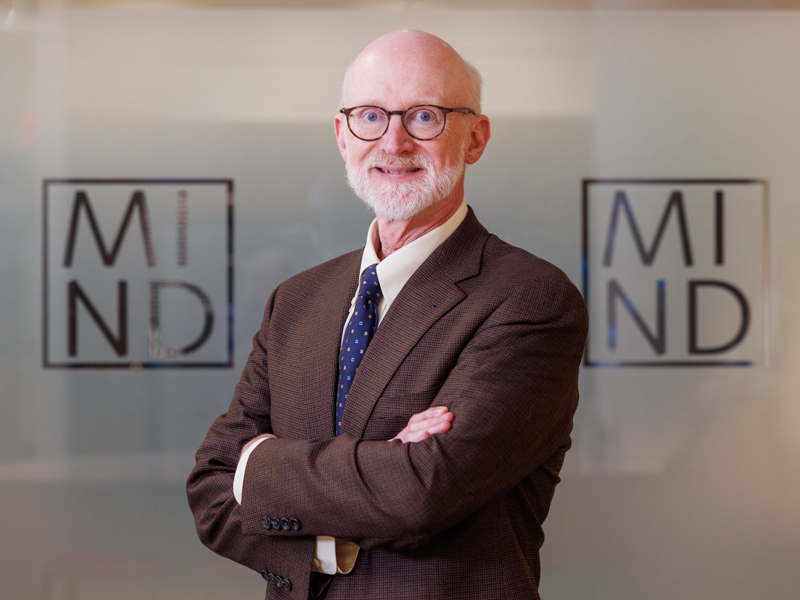MIND Center research informs community understanding, treatment of brain disease

Kimberly Burt’s brush with what would’ve been a life-changing diagnosis motivates her to walk up and down a hallway for good health at The MIND (Memory Impairment and Neurodegenerative Dementia) Center.
“I had a tumor removed near my salivary glands that turned out not to be cancerous,” said Burt, 67, of Jackson. “It’s made me want more knowledge about what’s going on in my body.”
Much the same goes for Liz Anderson, 73, a retired nurse midwife, also from Jackson, who’s having her reaction times tested in various ways in the name of brain health.
“It’s about early detection for me,” Anderson said. “I want to do whatever I can do to aid health care.”

Dedicated study participants such as Burt and Anderson contribute to The MIND Center’s understanding of brain aging, dementia and the connection between brain health and vascular issues in the body.
Burt is part of a study of aging led by The MIND Center, partnered by Mayo Clinic, that seeks to understand the causes that contribute to brain aging and dementia. Anderson is part of the MarkVCID study that aims to identify and validate biomarkers for small vessel diseases of the brain that produce vascular contributions to cognitive impairment and dementia (CVID).

“Our studies are directly translated into clinical guidelines and ultimately affect clinical care and produce better outcomes for older adults,” said Dr. Thomas Mosley, director of The MIND Center and the Robbie and Dudley Hughes MIND Center Chair, adding the center’s work has sought to explore links between Alzheimer’s and vascular issues.
“We know those two brain pathologies interact with each other and are still trying figure out how, exactly,” Mosley said. “The more we learn about biomarkers and different pathologies, the more we’ve learned that people in their 80s and 90s rarely have only Alzheimer’s or only vascular issues. They have other pathologies going on we don’t know a lot about.”
An important aspect of The MIND Center’s work is community outreach, and this week marks the 25th year of the Annual Conference on Alzheimer’s Disease and Related Dementias in Jackson. The event brings together nurses, nurse practitioners, nursing home administrators, physical and occupational therapists, speech-language pathologists, social workers, audiologists, mental health professionals, caregivers and older adults. The MIND Center has hosted the meeting the last eight years.
“Our conference offers a unique opportunity for professionals and family caregivers to connect, learn and grow,” Mosley said.
The best example of how the center’s research activities have influenced and improved the care of Alzheimer’s disease and related dementias (ADRD) is the Atherosclerosis Risk in Communities, or ARIC, Study.
ARIC, now in its 38th year, aims to find new ways to slow or prevent dementia, the most common type of which is Alzheimer’s disease. Dozens of researchers at 10 institutions including UMMC have studied 16,000 participants across four states, some of whom are now into their 90s, Mosley said.
“We’ve followed them since their mid-40s, with our oldest participant now 105,” Mosley said, adding the long-running study has influenced dementia guidelines with the American Heart Association for primary care providers that emphasize risk factors for poor health.
“Besides blood pressure being an important risk factor for stroke, it’s also important for cognition and dementia,” he said. “A lot of the guidelines on the concept of what’s good for your heart is good for your brain have come from data collected in the ARIC study.”
The MIND Center marks its 15th year in 2025 with big strides toward expanding its outreach in the community with a new facility.
A new four-story center to be named the Fred R. Adams, Jr. MIND Center and Geriatric Clinic is planned near UMMC’s main Jackson campus. It is expected to handle 6,300 patient visits annually and house the multidisciplinary staff of The MIND Center and geriatric clinics.
The new building will feature 18 exam rooms, consultation and therapy spaces, plus have an entire floor that will become home to the UMMC MIND Center-Mayo Clinic Study of Aging (Study of Aging) – thus bringing all the center’s clinical services and the Study of Aging under one roof.
The MIND Center will continue to host Caregiver University (CGU), a virtual training course now in its fifth year and designed for people caring for or who expect to care for someone with Alzheimer’s disease and related dementias. Classes held quarterly over the course of two weeks feature an array of topics including managing difficult behaviors, safety in the home, legal issues, medication management, health and wellness, caregiver support, end of life issues, caregiver resources and general information on ADRD.
“One of the recurring themes from CGU evaluations is the overwhelming tangible support participants feel from their classmates and CGU team,” said Kathy Van Cleave, director of education and outreach for The MIND Center and director of CGU. “Many are new to the ADRD journey or have never participated in a support group of any kind. CGU gives a brief introduction to the power of support in what can be a very isolative disease process.”
Participation in CGU is free and applications are required. The next class begins Sept. 16. Visit www.umc.edu/caregiveru for more information.


